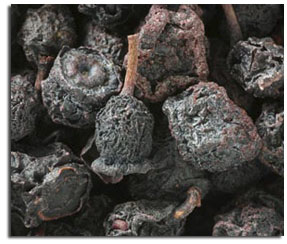
Bilberry Fruit Standardized Extract (25% Anthocyanidins)
Botanical: Vaccinium myrtillus
Family: Ericaceae (blueberry)
Other common names: Blueberry, Huckleberry, Black Whortles, Whortleberry, Burren Myrtle, Whinberry, Dyeberry, Wineberry, Grouseberry
Improve your vision! During World War II, some RAF pilots enjoyed
Bilberry jam on their bread, and it was noted that these men were more successful in hitting their targets. Later research discovered that Bilberry does, in fact, reduce eye irritation, nearsightedness and night-blindness, and it also extends range and clarity of vision. Pregnant women find the herb to be beneficial, as it fortifies veins and capillaries and combats fatigue.
Disclaimer
The information presented herein by Herbal Palace is intended for educational purposes only. These statements have not been evaluated by the FDA and are not intended to diagnose, cure, treat or prevent disease. Individual results may vary, and before using any supplements, it is always advisable to consult with your own health care provider.
History:
Bilberry is a shrubby perennial plant that is native to northern Europe and Asia. It is similar in appearance to the American blueberry, but it contains higher quantities of the constituents useful for improved eye health and better circulation. Its name is derived from the Danish bollebar, meaning dark berry, and its botanical name, vaccinium, means purple flower. In Elizabethan times, English herbalists prescribed “Whortleberry” for stomach complaints and diarrhea. American herbalists later combined whortleberries with gin to make a diuretic. Rich in lutein, tannins, bioflavonoids, calcium, inositol, magnesium, manganese, phosphorus, potassium, selenium, silicon, sulfur, zinc, B-vitamins, vitamin C, glycosides, fruit acids, and glucoquinone (and more), Bilberry has long been a well-known folk remedy for poor vision. Modern European medical journals are filled with studies confirming Bilberry’s positive effect on vision.
Beneficial Uses:
Bilberry helps to preserve eyesight and prevent eye damage. It is particularly useful for people who suffer from eyestrain or poor night vision and is helpful for nearsightedness (myopia). The fruit is beneficial in strengthening the red blood cells and capillaries around the eyes and thereby increases circulation of blood and nutrients to the many blood vessels in the eyes.
Botanical: Vaccinium myrtillus
Bilberry has been used to regulate bowel action. It is a mild but strong astringent that has been effective in treating dysentery and diarrhea. It is an antiseptic that helps treat urinary tract infections and is said to curb intestinal putrefaction (which produces flatulence and gas), helping to reduce stomach cramps.
Italian scientists have discovered that Bilberries contain significant, curative anti-ulcer activity, which they attributed to the fruit’s anthocyanoside (a flavonoid) content.
Bilberry has also been used as a mild diuretic and is said to relieve bloating and rid the body of excess water retention.
Herbalists say that Bilberry tea makes a fine mouthwash or gargle and also recommend its use to relieve inflamed gums and tongue; it is held in the mouth for a while and then swallowed.
Bilberry is most effective when taken over a period of time as a dietary supplement that helps to strengthen the immune system.
Recommended Dosage:
Take one (1) capsule, one (1) time each day with an early to mid-day mealtime.
Contraindications:
Currently, there are no warnings or contraindications with the use of Bilberry.